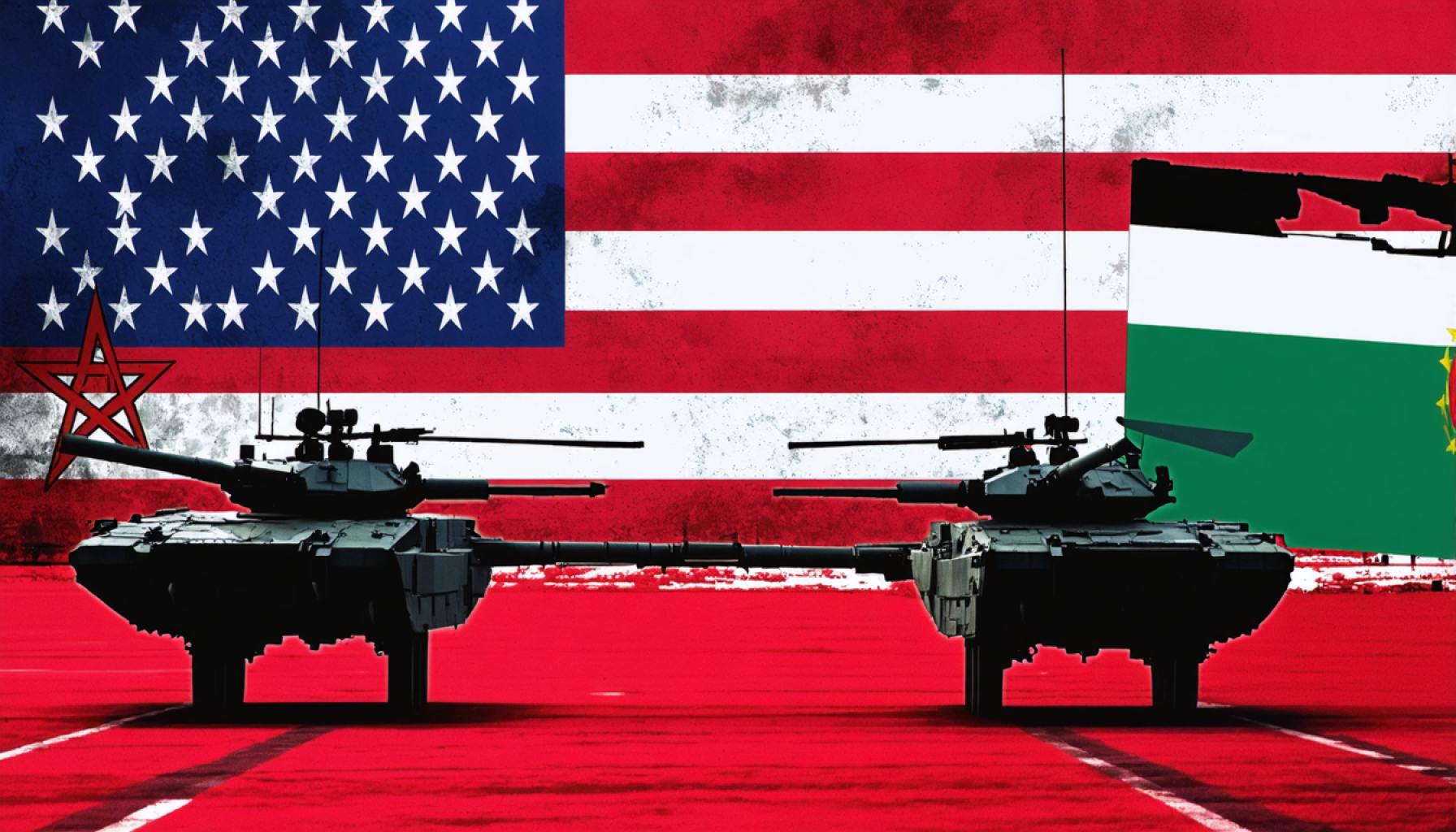- Lockheed Martin has entered a historic supply deal with Morocco to enhance its military capabilities, emphasizing the transformation of Morocco into a security and innovation hub.
- Key figures from Lockheed Martin, including Tim Cahill and Joseph Rank, engaged with Morocco’s industrial leaders to integrate local potential into the global defense supply chain.
- The deal introduces F-16 jets, Sikorsky helicopters, and Patriot missile systems, reinforcing Morocco’s sophisticated air defense network.
- This partnership supports Morocco’s goal of self-reliance and aligns with its Law No. 10-20, aiming to boost local defense industry innovation.
- The collaboration strengthens Morocco’s role as a regional ally, countering threats and participating in joint exercises, enhancing stability in North Africa.
- US-Moroccan ties are underscored by diplomatic support on issues like Western Sahara and participation in the Abraham Accords, highlighting Morocco’s strategic value.
A flurry of activity marked the latest chapter in US-Moroccan defense relations as Lockheed Martin, the American aerospace titan, set foot on Moroccan soil with a mission: enhancing military capabilities through a historic supply deal. Against the backdrop of Casablanca’s vibrant streets, this partnership now promises to transform Morocco into a regional fortress of security and innovation.
An entourage from Lockheed Martin, led by influential figures like Tim Cahill and Joseph Rank, engaged with Morocco’s key players in the industrial sector. Their goal was clear: integrate Morocco’s formidable potential into a global supply chain that keeps the world’s skies safe. Factories buzzed with anticipation as teams explored facilities such as TDM Maroc and Collins Aerospace RFM. These sites represent the blueprint of Morocco’s future defense industry, poised to flourish under the shadow of Lockheed’s mighty wings.
Central to this burgeoning cooperation is the introduction of F-16 Fighting Falcons. These sleek, versatile jets are not just symbols of power but a testament to Morocco’s commitment to modernizing its defenses. Alongside Sikorsky helicopters and advanced Patriot missile systems, these assets form the backbone of a sophisticated air defense network tailored to withstand the most daunting of future challenges.
Yet this deal isn’t just about hardware. It’s an emblem of strategic foresight, weaving Morocco deeper into the tapestry of global security alliances. Lockheed’s pledge to echo the Kingdom’s aspirations for self-reliance marks a bold stride towards a robust domestic defense industry. This vision resonates with the Moroccan government’s Law No. 10-20, striving to cultivate homegrown innovation and industrial prowess.
With 121,000 employees worldwide and operations spanning continents, Lockheed Martin brings unparalleled expertise. Their engagement underscores a mutual desire to propel Morocco onto the world stage. This relationship is not merely transactional but extends to fostering local talent, catalyzing technological development, and nurturing future Moroccan leaders within the defense sphere.
At a geopolitical level, this collaboration is a pillar of stability amid North Africa’s tumultuous landscape. Morocco stands as a steadfast ally in the region, countering the nefarious activities of extremist factions and criminal syndicates. The ongoing joint military exercises, like the renowned African Lion, amplify Morocco’s role as a keystone of security infrastructure in the Sahel and beyond.
The hearty ties between the United States and Morocco stretch back centuries, with diplomacy that’s been continually evolving. The US’s recognition of Morocco’s stance on Western Sahara exemplifies a crucial diplomatic alignment, addressing substantial regional conflicts and reinforcing territorial integrity.
Moreover, Morocco’s active participation in the Abraham Accords, paving avenues of peace and prosperity in the Middle East, underscores its strategic value. This political harmony paves the way for Morocco to become not just a warrior, but also a peacemaker in a fragmented world.
As Lockheed Martin’s planes take off from Moroccan bases, they carry more than might—they symbolize a partnership ready to soar into the future, embodying a shared commitment to safeguarding what is just, fostering innovation, and crafting a secure tomorrow for coming generations.
This Powerful New Deal Brings Morocco’s Defense Into the Spotlight—What Does It Mean for the Future?
Overview of US-Moroccan Defense Relations
In a significant development, Lockheed Martin, a leading American aerospace company, has forged an impactful partnership with Morocco to enhance military capabilities through a historic supply deal. This collaboration is designed to transform Morocco into a regional stronghold of security and innovation, reflecting a deep strategic alignment between the two nations.
Key Features of the Partnership
– Integration of Advanced Military Hardware: The introduction of F-16 Fighting Falcons is central to modernizing Morocco’s defense capabilities. These jets, known for their versatility and performance, are complemented by Sikorsky helicopters and advanced Patriot missile systems.
– Empowerment of Local Industry: Lockheed Martin’s collaboration with Moroccan industrial players, like TDM Maroc and Collins Aerospace RFM, aims to integrate the country into the global supply chain, focusing on local innovation and domestic production prowess.
– Strategic Foresight and Self-Reliance: This partnership aligns with Morocco’s Law No. 10-20, designed to boost homegrown innovation and industrial competence, fostering a culture of self-reliance within its defense sector.
– Fostering Geopolitical Stability: Morocco’s strategic location in North Africa, along with its participation in the African Lion joint military exercises, highlights its role as a keystone in regional security, countering extremist factions and supporting peace initiatives.
How This Partnership Benefits the Region
– Economic and Technological Growth: By aligning with Lockheed Martin, Morocco stands to gain technological expertise, stimulate local industry growth, and create jobs, thereby enhancing economic stability.
– Enhancement of Defense Infrastructure: This deal fortifies Morocco’s defense infrastructure, preparing it to address future challenges in a volatile North African landscape.
Understanding the Broader Implications
– US-Moroccan Diplomatic Relations: This partnership symbolizes the robust and historic diplomatic ties between the US and Morocco, whose collaborative efforts extend to significant geopolitical issues like the Western Sahara conflict.
– Role in the Arab World: Morocco’s role in the Abraham Accords illustrates its strategic importance as a peace broker, fostering greater stability and cooperation within the Middle East.
Implementing Defense Strategies: A How-To Guide
1. Assess and Upgrade Existing Military Infrastructure: Begin by analyzing current capabilities and infrastructure to identify gaps and potential upgrades.
2. Focus on Technology Transfer and Training: Emphasize skill-building and technology transfer to develop local expertise in operation and maintenance.
3. Strengthen Alliances: Continue to participate in joint military exercises like the African Lion to foster international collaboration and preparedness.
Real-World Impact and Future Outlook
Trends and Predictions
– Increased Defense Spending: Expect augmented defense budgets to accommodate and sustain advanced technologies and equipment.
– Regional Security Cooperation: Look for Morocco to strengthen ties with neighboring countries, facilitating a collective approach to regional security.
– Rising Influence as a Strategic Ally: Morocco is likely to amplify its role as a critical ally to Western nations, contributing to global peace and security efforts.
Final Recommendations
– Invest in Education and R&D: Develop educational programs and R&D centers to fuel continuous innovation in defense technologies.
– Explore Alternative Energy Initiatives: Given the global emphasis on sustainability, consider investing in sustainable technologies within the defense sector.
– Strengthen Cybersecurity Measures: With increased digital reliance, focus on building resilient cybersecurity frameworks to protect new technologies.
For more on international defense collaborations, explore the official site of Lockheed Martin and learn about their global initiatives.








